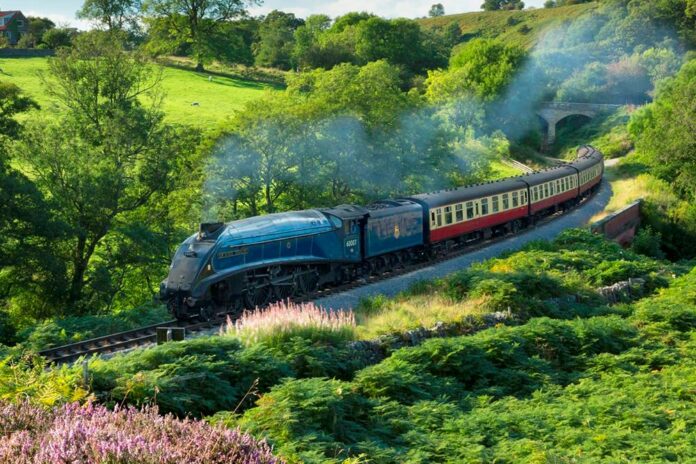Newcastle City Council has refused planning permission for a new surface coal mine at Dewley Hill.
The decision means an end to UK-based coal production, and has dashed the hopes of Britain’s heritage railways, who need affordable coal to continue operating.
Steve Oates, Chief Executive of the Heritage Railway Association said: “The decision is a huge disappointment. We spoke at the planning committee meeting and we had argued a strong case. UK-produced coal generates a fraction of the CO2 emissions created by extracting and then shipping coal half-way round the world to the UK. And it costs less in money terms, too.
“Keeping Britain’s heritage railways running with affordable locally-produced coal would secure the future of a sector which sits at the heart of the country’s industrial and cultural heritage, and generates millions for the leisure and travel sector.”
Steam railway operators across the UK made representations to Newcastle’s planners. So, too, did the National Traction Engines Trust, the Heritage Fuels Alliance, The Heritage Alliance and the Association of British transport and Engineering Museums.
Strong support was provided by Sir Peter Hendy, Chairman of Network Rail, who said: “Steam on the main line attracts tens of thousands of spectators, warming the market for our railway in general, and the two Science Museum Group museums in the North East, Locomotion at Shildon and the National Railway Museum at York attracts 750,000 visitors per year lured by the romance and operation of steam locomotives.
“With the remaining stocks of English coal, this should supply UK steam locomotives until early 2021. The financial burden loco operators and heritage railways would face in adapting their steam locomotive fleet to burn alternative fuels would be impossible to overcome. Approval of the Dewley Hill mine scheme would bring a reprieve to the nation’s heritage steam locomotive operators, currently dependent on the dwindling availability of home-produced coal.”
Without domestically-produced coal, the heritage steam sector will have to find ways to import, store, handle and distribute the coal it needs. “Maintaining consistent and reliable supplies of coal is difficult and expensive”, said Oates. “That burden will now fall on our members, whose finances have already been hard-hit by the COVID-19 pandemic. The inevitable increase in the cost of coal may well be too much for some of our members to bear.”
Existing stocks of English steam coal will last into early 2021, while coal supplies from Wales are currently expected to end in 2022.
Looking to the future, Steve Oates said: “Naturally we will watch carefully whether the applicants choose to lodge an appeal. We’re also awaiting the outcome of the Welsh Government’s consultation on their draft coal policy. Meanwhile we now have no alternative but to press ahead with our work on developing a coal importing operation, while also supporting US research and development work on biocoal.”
Jeannie Raine, community relations manager at The Banks Group, says: “Newcastle City Council identified Dewley Hill as the only minerals site in the city less than six months ago.
“Given this fact, it is outrageous that, in the height of the worst economic crisis of our generation, its planning committee has decided to dismiss over 200 existing, well-paid North East jobs and has not grasped the opportunity to support a £75m investment in the regional economy which would secure local supplies of much-needed minerals at the lowest environmental cost.
“The committee heard, but did not listen to the indisputable fact that there will be continued demand for industrial coal and fireclay for use in UK steel, cement and brick manufacture, and we remain firm in our belief that these minerals should be mined locally in the UK in the safest, most efficient and most environmentally responsible way possible.
“The acute need of the Throckley Brickworks for fireclay could not be met with a lower environmental impact than through the adjacent Dewley Hill site, and its owners Ibstock Brick have clearly repeated how much of a devastating blow its rejection would be in terms of production, local employment and investment.
“The committee members also chose to ignore warnings from both Unite the Union and the Heritage Railway Associations that failing to make use of domestic supplies will force UK industry to drag the coal across the globe while simultaneously significantly increasing global greenhouse gas emissions – and all in the name of a simplistic view on climate change.
“We remain grateful to the 1,450 individuals, community groups and organisations that have submitted letters in support of the Dewley Hill scheme, and will now examine the precise reasons for this decision before deciding on the most appropriate next steps to take.”
Photo credit: Heritage Railway Association
For today’s rail news from railbusinessdaily.com click here.







































 0113 2082620
0113 2082620 info@railbusinessdaily.com
info@railbusinessdaily.com 15 Mariner Court, Wakefield WF4 3FL
15 Mariner Court, Wakefield WF4 3FL

